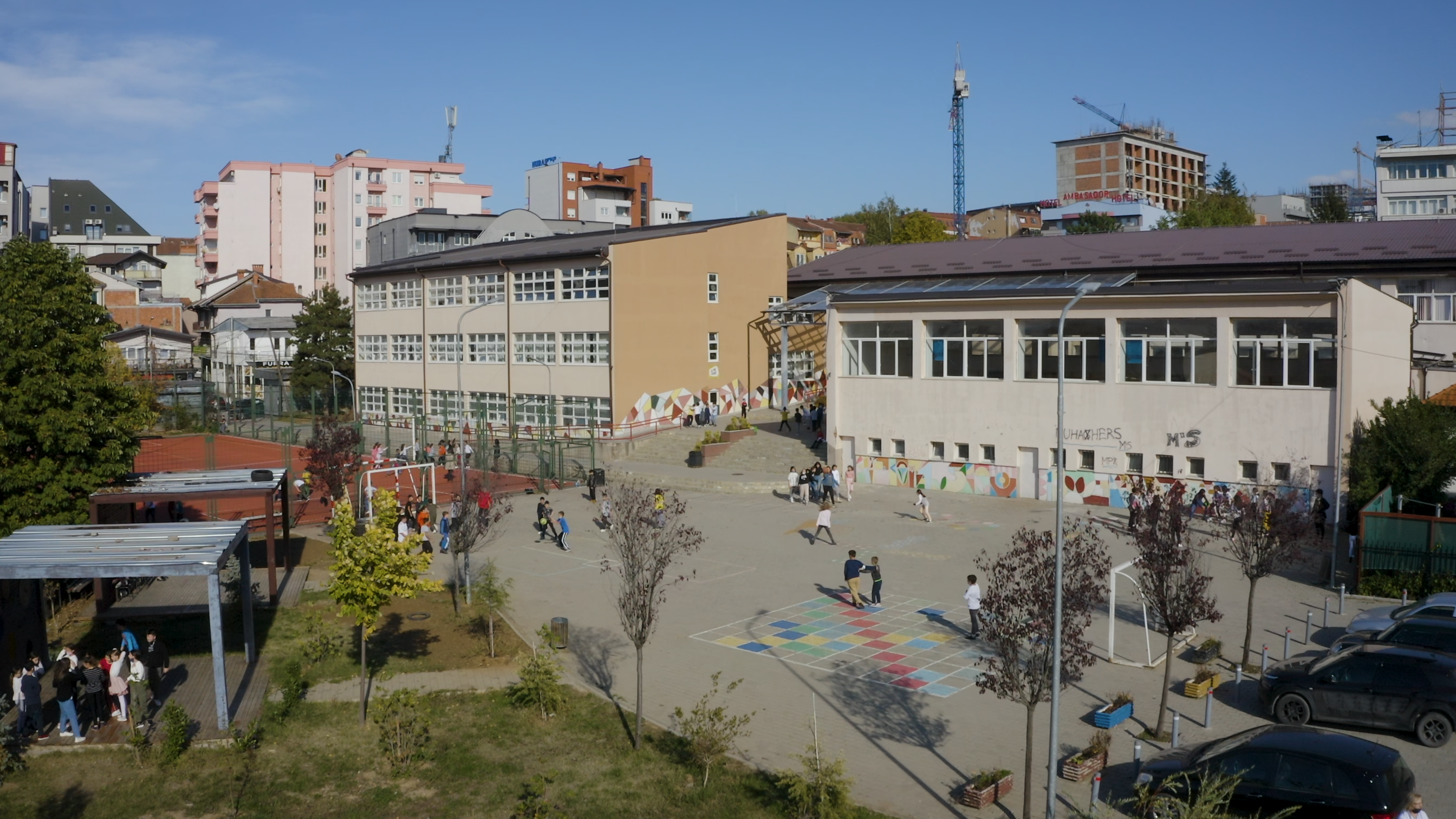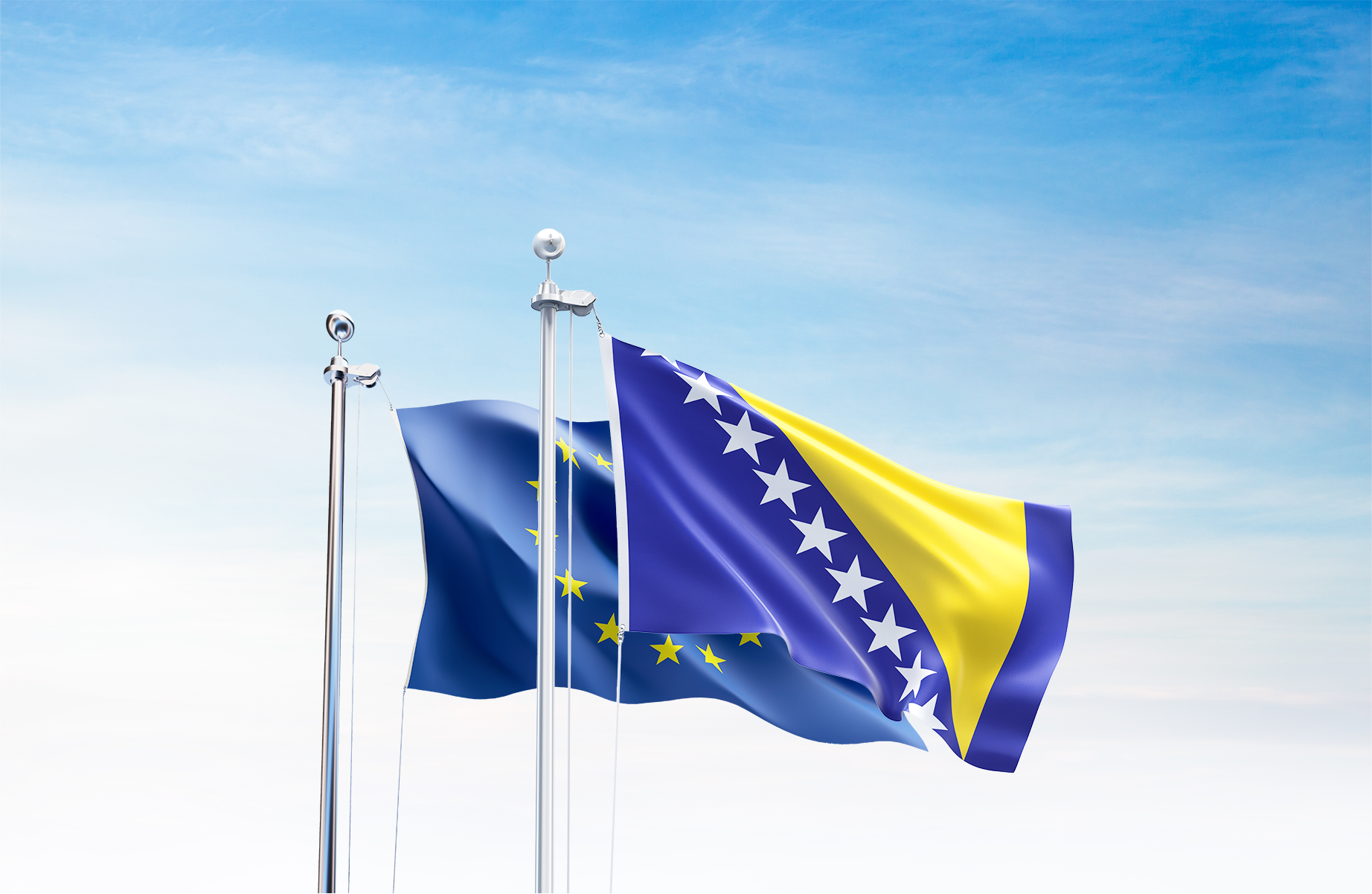Embracing a Sustainable Future: Understanding Zero Waste Day and Waste Management in Novi Sad and Skopje
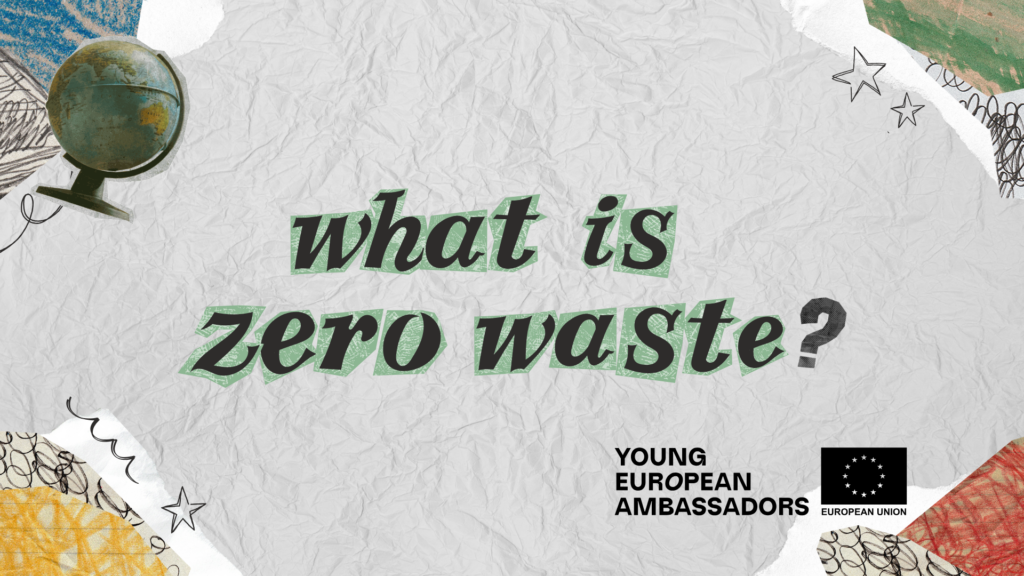
Embracing a Sustainable Future: Understanding Zero Waste Day and Waste Management in Novi Sad and Skopje
Author: Vuk Stanojev | Visuals: Marija Burgieva
Did you hear about the Zero Waste concept and weren’t sure what it meant or how you could implement that lifestyle? Are you curious about waste management in Novi Sad and Skopje or how much cities produce the waste annually? Let’s deepen this topic together.
What is Zero Waste?
When you throw out your clothes when you stop wearing them, or how you deal with your waste at home can potentially harm the environment. Not only individuals but also companies can manage their waste in potentially risky ways that could affect sustainability, whether through water pollution or using one-time plastic as packaging. That’s where Zero Waste steps in to try to correct our behaviour as consumers and companies.
ZWIA (Zero Waste International Alliance) adopted the following definition in 2018: “Zero Waste: The conservation of all resources by means of responsible production, consumption, reuse, and recovery of products, packaging, and materials without burning and with no discharges to land, water, or air that threaten the environment or human health.” ZWIA defined zero waste as diverting at least 90% of waste from landfills and incinerators (a furnace for burning waste).
This 30th March, we celebrate International Zero Waste Day, which is observed to promote sustainable waste management and the circular economy in local communities and worldwide. This year’s theme is “Toward zero waste in fashion and textiles,” emphasising the urgency for taking action to reduce waste impact in the fashion and textile industries. We can all understand why this year’s theme is textiles and clothes, and if you are not sure, here are some facts to think about.
- 92 million tonnes of textile waste is produced every year
- The number of times a garment is worn has declined by around 36% in 15 years
- The fashion industry is responsible for 20% of global waste water
- Fast fashion brands are producing twice the amount of clothes today than in 2000
- Nearly 10% of microplastics dispersed in the ocean each year come from textiles
There are different initiatives for how people celebrate today. Zero Waste Day is celebrated through seminars, repair workshops, clothing swaps, and community clean-ups. This can also be a call to action for you! You can look up what is happening in your local community and join some of the activities.
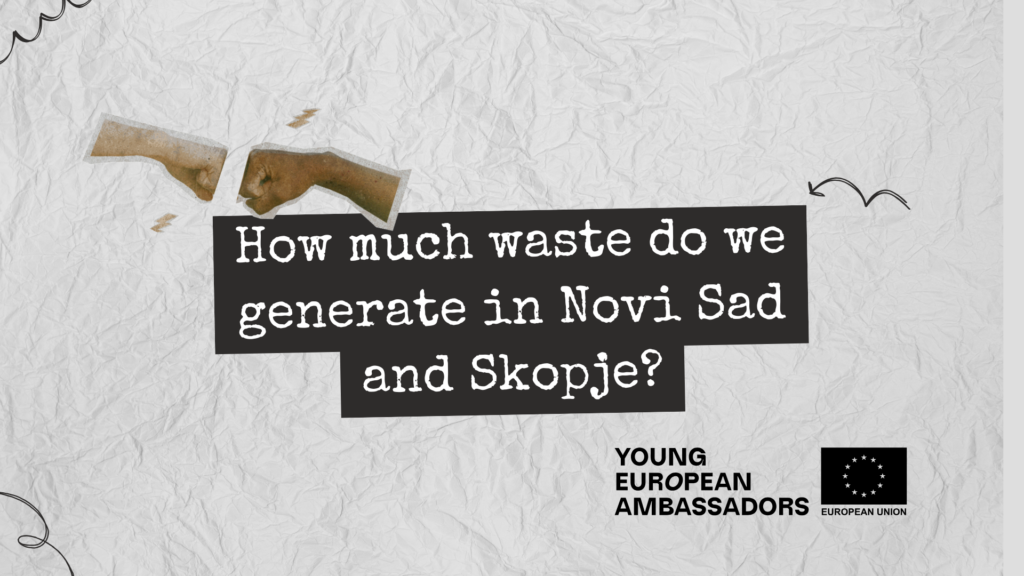
How much waste do we generate in Novi Sad and Skopje?
The South Bačka Waste Management Region, which includes Novi Sad, generated around 204,770 metric tonnes of solid waste each year (SWEET case study 2021) and half of that waste was organic material. In 2019, for example, Novi Sad generated 135,194 tonnes of municipal solid waste, of which 50% was biodegradable.
The Skopje Region collected 169,515 tonnes of municipal waste in 2023, which is the highest amount in North Macedonia. In the same year, North Macedonia generated a total of 878,303 tonnes of municipal waste, with an annual per capita generation of 503 kg. In 2016, in the Skopje region, there was 42.3% organic waste and 39.5% recyclables out of the total number of waste generated in that year.
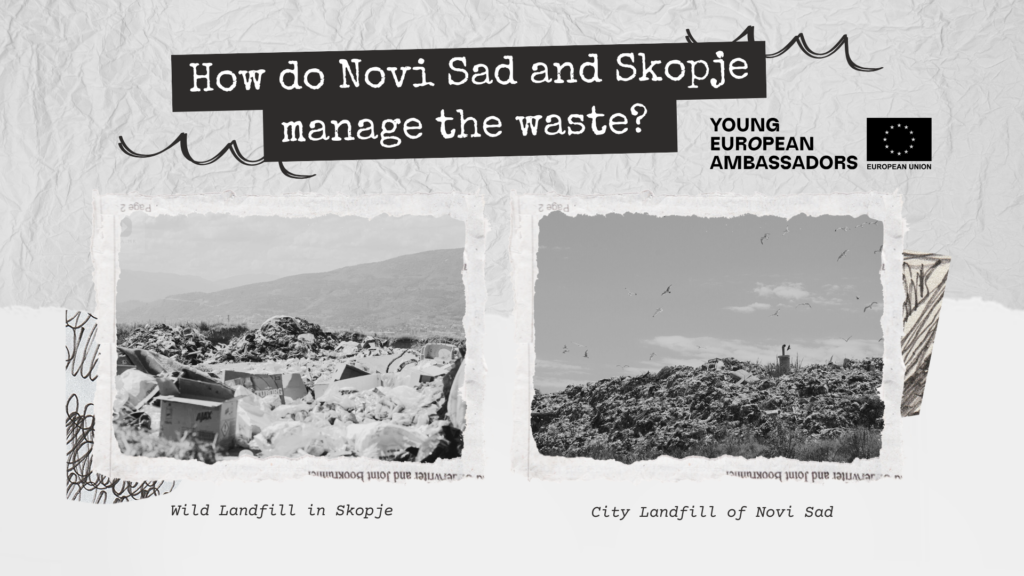
How do Novi Sad and Skopje manage the waste? Connection to EU; circular economy; Green Agenda; SDGs
In Novi Sad, the primary method for waste disposal is landfilling. In 2020, Novi Sad established its first municipal composting plant with the goal to divert at least 50% of organic waste that would usually go to landfills by 2026. A regional waste management system is being developed for Novi Sad and seven surrounding municipalities with the help of EU funds and technical assistance. Public utility company “Čistoća” is responsible for waste management in Novi Sad
Skopje primarily relies on landfilling when it comes to waste disposal; however, the recycling rate is pretty low. The Drisla landfill is the only compliant municipal waste landfill serving Skopje, and the public communal enterprise “Komunalna Higiena” is the main waste collector in Skopje.
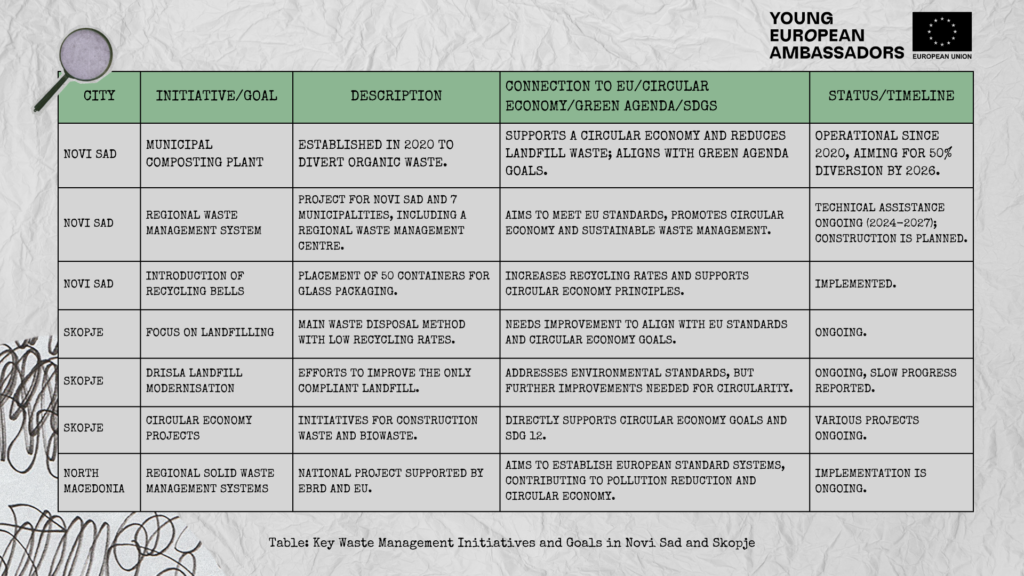
Both Serbia and North Macedonia are aligned with EU regulations when it comes to waste management in their respective cities. There is still a long way to go to achieve the goal of effective waste management, but the EU is helping with financial support and funds. In November 2020, Serbia linked the European Green Deal by signing the Green Agenda for the Western Balkans, which supports strategic development of the region. North Macedonia also integrated the Green Agenda for the Western Balkans to improve its waste management and altogether promote a circular economy. When it comes to the UN’s Agenda 2030, both Novi Sad and Skopje are contributing to SDG 12 (the Sustainable Development Goal) on responsible consumption and production, and in both cases, significant challenges remain.
How can we improve our daily habits by implementing the zero-waste concept?
Now, when you are familiar with Zero Waste and a glimpse of how two cities in Western Balkans deal with their waste and what initiatives are ongoing to transfer waste from problem to solution, let’s mention what YOU can do as an individual. There is an acronym “5 R’s” of zero waste: Refuse, Reduce, Reuse, Recycle, and Rot (which means compost).
I know there is always a problem with using disposable utensils on picnics or getting your amazing hot coffee from your favourite coffeeshop, but you can REFUSE to be part of the problem and become part of the solution. Bring your own utensils and store them in a container back home, where you’ll wash them thoroughly. From my experience, you can ask the barista to make your coffee in your own cup. If they refuse, there must be plenty of coffee shops where you can try this method. Say no to single-use plastic and unnecessary packaging.
We tend to like new things and popular products that are trending at the moment, whether we see them on social media from influencers or by visiting stores and saying to ourselves, “I’ll just look,” and end up buying unnecessary stuff. Try to REDUCE consumption of different goods by asking yourself; Do I really need this right now? It’s the same with food—try not to stockpile food in your kitchen; it’s better to visit the shop more times where you’ll be less likely to have food waste. You can plan your meals in advance.
Sometimes, trends can be useful for the environment; for example, Stanley Cups were a huge deal on social media, and it must have changed some people’s habits of not buying single-use bottles of water. So, when you REUSE everyday products, you are helping yourself, your surroundings, and our planet to make it more clean and sustainable for all of us. Don’t forget to bring your own bag next time you go shopping.
If you want to RECYCLE, make sure that materials are possible to recycle locally and that they are clean and dry before taking them to the recycling islands or any other place that is suitable for recycling; for example, there are some shops and supermarkets where you can bring different materials or even batteries and lightbulbs.
Last but not least, ROTting is referring to composting food scraps and yard waste so you don’t produce biodegradable waste at home, which mostly causes landfills to burn and methane emissions from the landfills themselves.
Nothing is changed overnight, so neither are your daily habits. Starting step by step with zero waste and, over time, adding gradually more sustainable practices can lead to a significant effect at an individual level.
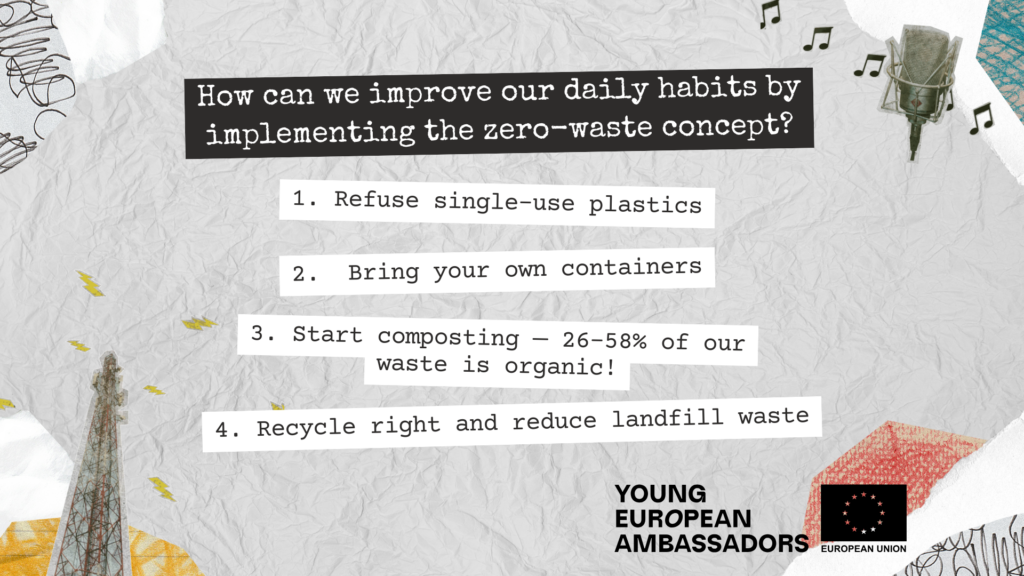
Conclusion
By celebrating Zero Waste Day annually, we remind ourselves of the urgent need to address the problem of global waste and the importance of sustainable practices. Starting small can eventually make a big impact by inspiring others to join the cause. Novi Sad and Skopje have challenges in managing waste generated by their populations. Landfilling is common practice in both cities, and there are some moves towards more sustainable waste management systems. The connection to the European Union plays a vital role in driving improvements in waste management, and access to EU funds is a key factor in the ongoing modernisation efforts. Such a big transition requires collective effort. By implementing zero-waste principles and making conscious choices, people all around the world can significantly reduce their waste footprint.


